NEWS
21 Energy-Hungry Home Gadgets That Spike Your Monthly Power Bill
Published
9 months agoon
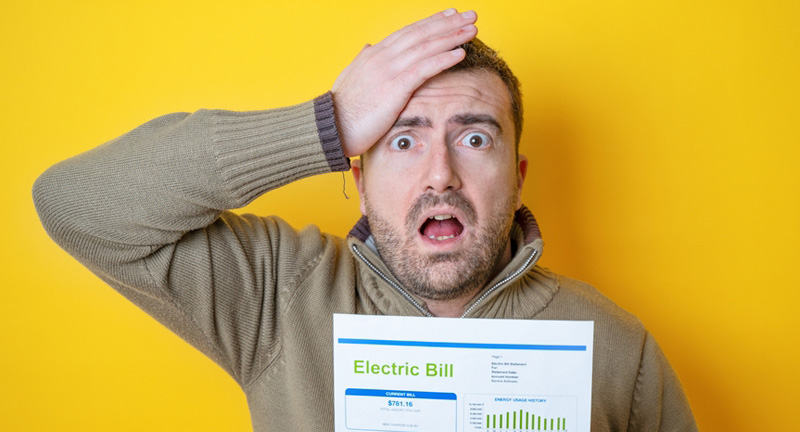
Shutterstock
Modern homes are equipped with various devices and appliances essential for comfort, convenience, and entertainment. However, these essential items significantly contribute to your monthly electricity expenses. Heating and cooling systems, kitchen appliances, and entertainment devices each consume different amounts of energy, with some being particularly energy-intensive. Recognizing which household items heavily impact your energy consumption is vital for effectively managing your electricity costs. This guide explores 20 such appliances known for their high energy use, offering insights into their functions and tips on reducing their energy consumption.
Energy Efficiency Tips for Electric Stoves and Ovens
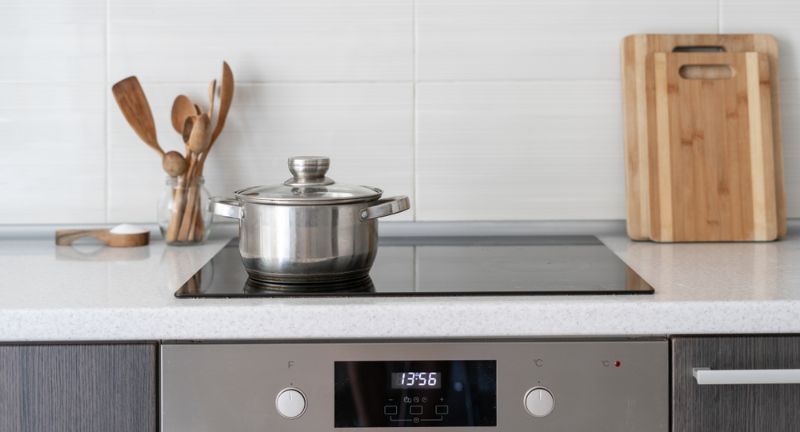
Shutterstock
Electric stoves and ovens are significant electricity consumers in the kitchen, especially during prolonged cooking sessions. The energy required to heat their elements and maintain desired cooking temperatures can notably increase household electricity bills. To mitigate energy consumption, consider adopting energy-efficient cooking habits such as matching pots to the size of stove elements and minimizing the opening of oven doors. Additionally, opting for alternative cooking methods, like using microwaves or slow cookers for suitable recipes, can further help in conserving energy.
Energy-Efficient Pool Pump Solutions
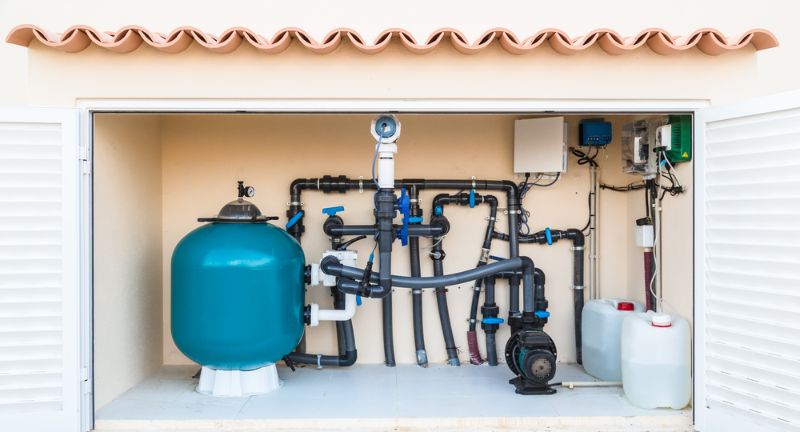
Shutterstock
Maintaining a clear and clean swimming pool relies heavily on pool pumps, which can be significant electricity consumers when run continuously. A more energy-efficient alternative is to upgrade to a variable speed pump. These pumps adjust their speed to match the pool’s needs, offering notable energy savings. Additionally, scheduling the pump to run during off-peak electricity hours can reduce energy costs. Regular maintenance, including cleaning the pump’s filters and ensuring it runs efficiently, can further minimize electricity usage.
Impact of Lighting on Household Energy Consumption
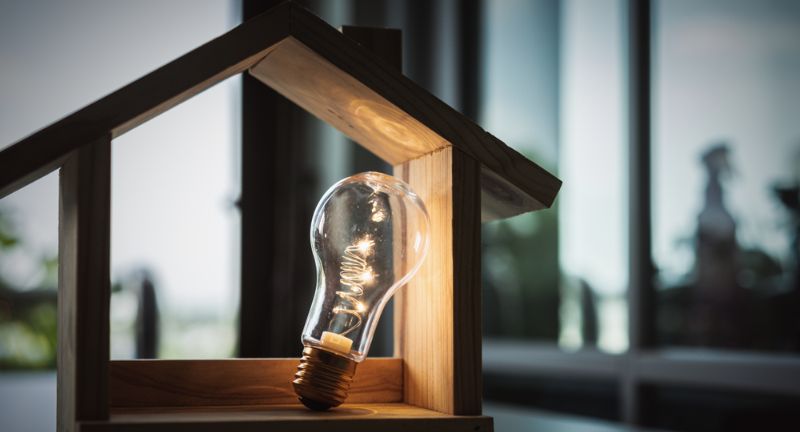
Shutterstock
Lighting significantly influences a household’s electricity usage, especially when relying on energy-hungry incandescent or halogen bulbs. Switching to LED bulbs can greatly cut down on energy consumption and electricity bills. LED technology stands out for its efficiency, using up to 75% less energy and lasting 25 times longer than incandescent bulbs. Additionally, making use of natural daylight and turning off lights in unoccupied rooms can further reduce energy usage.
Energy Efficiency with Washing Machines
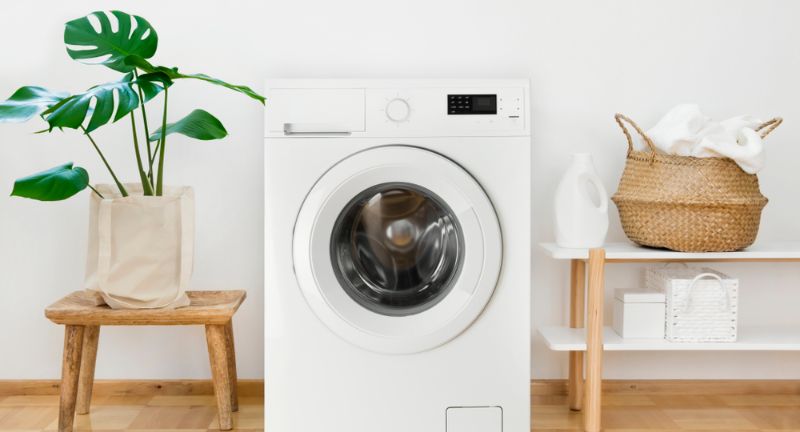
Shutterstock
Washing machines are significant contributors to household electricity usage, especially those capable of heating water directly. Using cold water for laundry can greatly reduce energy consumption, as heating water accounts for a large portion of a washing machine’s energy expenditure. Purchasing energy-efficient washing machines designed to minimize water and electricity use can further decrease electricity costs. Regular maintenance and operating the machine with full loads are effective strategies to enhance efficiency and reduce energy usage.
Energy-Efficient Water Heaters
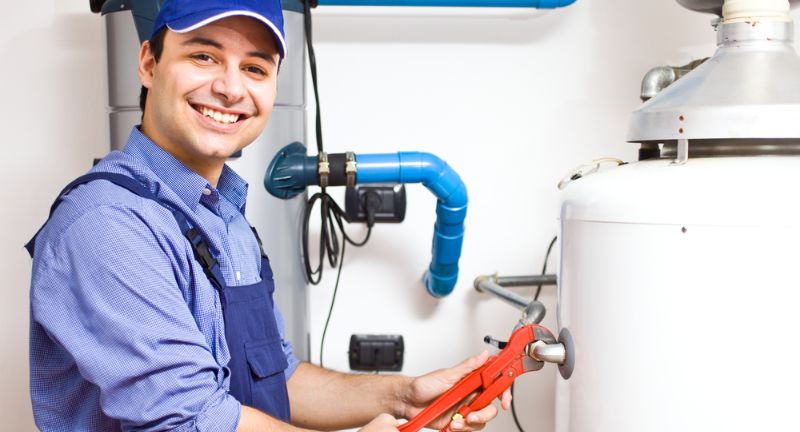
Shutterstock
Water heaters play a crucial role in supplying hot water for showers, laundry, and kitchen applications, making them one of the highest electricity consumers in a household. Traditional tank water heaters work by continually keeping a reservoir of water hot, leading to persistent energy use. Transitioning to energy-saving options, such as on-demand or tankless water heaters, can significantly reduce electricity usage by heating water only when necessary. Furthermore, reducing the thermostat setting on the water heater and insulating the tank can help further minimize energy consumption.
Energy-Efficient Coffee Makers
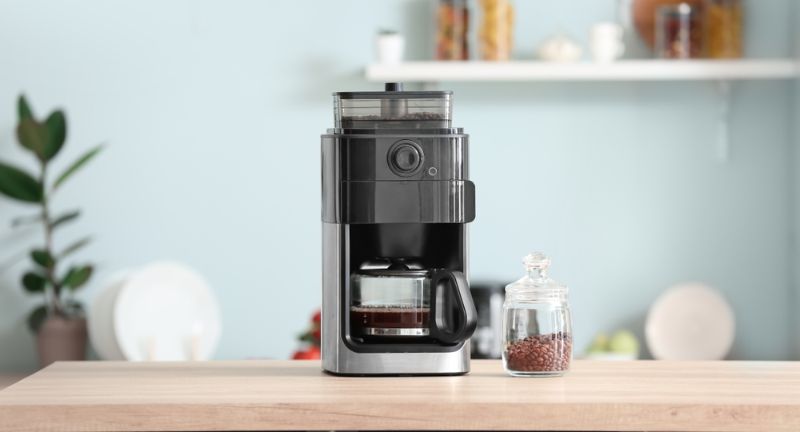
Shutterstock
Coffee makers, particularly high-end models that maintain water at the optimal brewing temperature throughout the day, can greatly increase electricity consumption. To mitigate their impact on your electricity bills, it’s recommended to choose models that brew coffee on demand, rather than continuously heating water. Additionally, turning off the coffee maker when it’s not in use and avoiding models with extra features that increase energy consumption can help save energy. Regular descaling and maintenance of the coffee maker not only ensure its efficient operation but also contribute to reducing energy usage.
Air Conditioners: Managing Costs
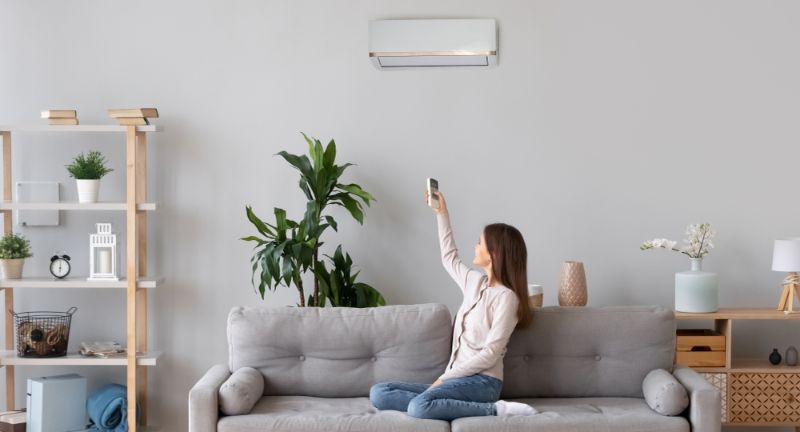
Shutterstock
Air conditioning units significantly drive up electricity expenses, particularly in regions with hot climates. These systems consume a large amount of power to cool indoor spaces, resulting in high operational costs during the warmer months. While modern, energy-efficient air conditioners can help reduce energy consumption, the cost of cooling a home remains substantial. To mitigate these expenses, homeowners are advised to perform regular maintenance on their AC units, use programmable thermostats, and employ additional cooling strategies such as ceiling fans to minimize reliance on air conditioning.
Efficient Use of Window Air Conditioning Units
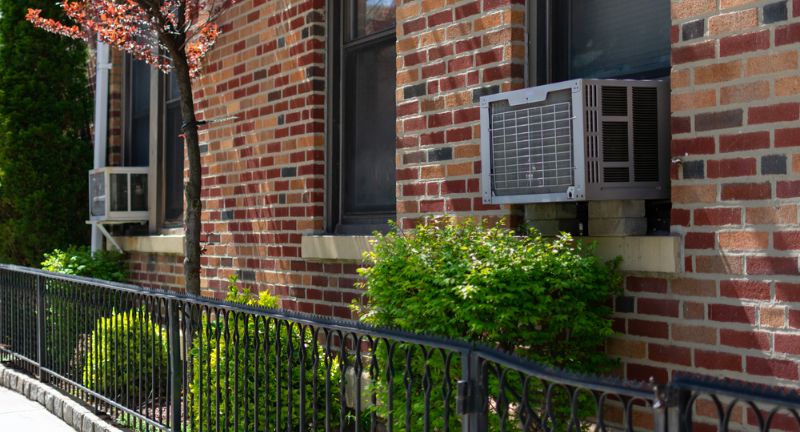
Shutterstock
Window air conditioning units, while more compact than central air systems, can still result in significant electricity usage, particularly during hot weather periods. These units offer a practical solution for cooling specific areas; however, they may not be as energy-efficient as centralized systems or the latest energy-saving models. To reduce energy consumption, it’s crucial to select a unit that is appropriately sized for the room it is intended to cool. Regular maintenance and the use of window shades to limit indoor heat can also contribute to energy conservation. Additionally, upgrading to a higher energy efficiency model can lead to substantial reductions in electricity costs.
Energy Efficiency Tips for Dishwashers
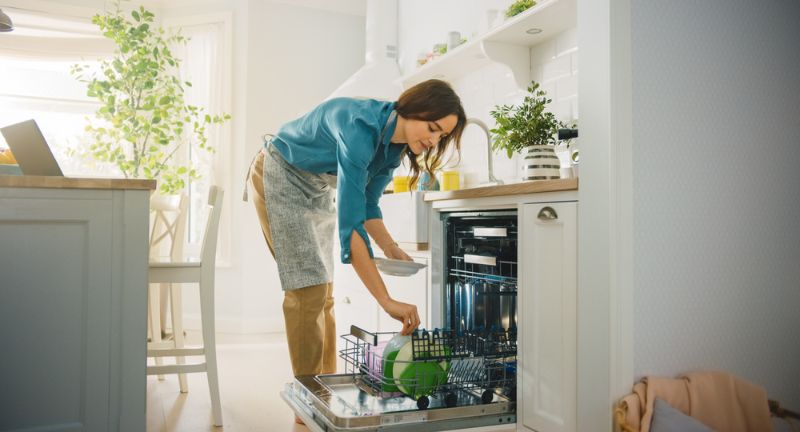
Shutterstock
Frequent use of dishwashers can lead to increased electricity and hot water consumption, impacting your energy bill. To minimize energy usage, opt for an energy-efficient model and ensure it is fully loaded before each run. Utilizing eco-friendly washing cycles and forgoing the heated dry feature can further reduce energy consumption. Regular maintenance, such as cleaning the dishwasher’s filters, can enhance its efficiency and contribute to additional energy savings.
Efficient Use of Microwave Ovens
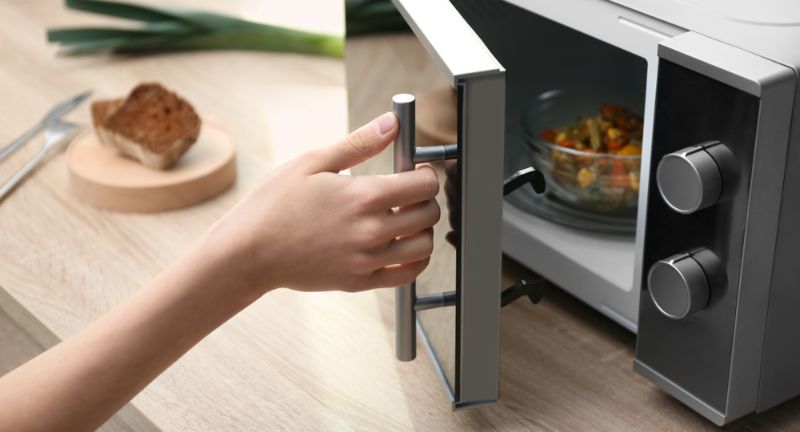
Shutterstock
Microwave ovens are known for their efficiency in performing quick heating or cooking tasks. However, frequent or prolonged use can result in higher electricity bills. Their convenience has made them a common appliance in many kitchens. To minimize energy consumption, it is recommended to use microwaves for suitable dishes and to heat or cook multiple items simultaneously if feasible. Regular maintenance, such as keeping the interior clean for optimal performance, also helps in lowering energy usage.
Energy Efficiency in Vacuum Cleaners
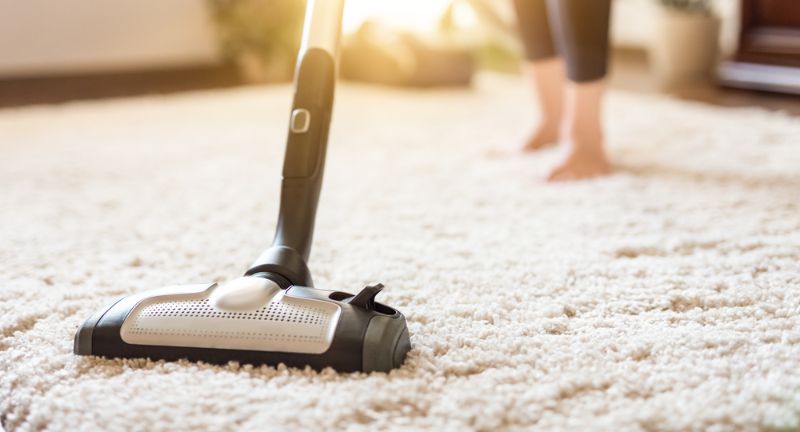
Shutterstock
High-powered vacuum cleaners can significantly impact your electricity bill, especially in larger homes where frequent use is necessary to maintain cleanliness. Choosing an energy-efficient vacuum model can help reduce energy consumption. Additionally, making efficient use of the vacuum by adjusting settings for different floor types and utilizing attachments effectively can further lower energy usage. Regular maintenance, such as cleaning filters and checking for blockages, ensures the vacuum cleaner operates at optimal efficiency, thereby enhancing its energy efficiency.
Dehumidifiers
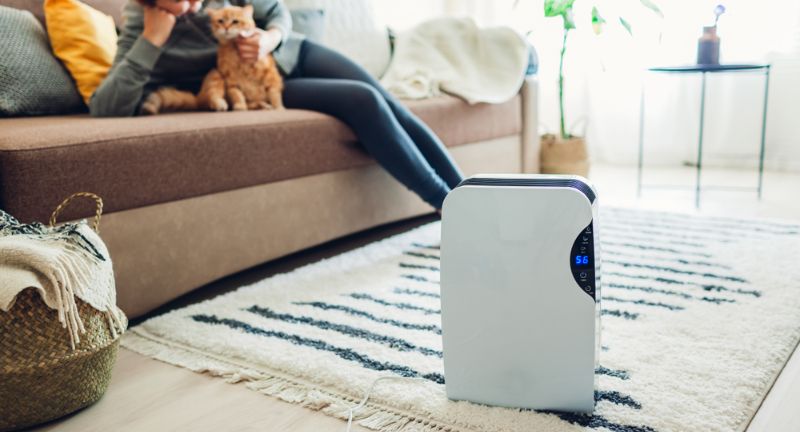
Shutterstock
Dehumidifiers are essential for controlling moisture in humid areas, but they can lead to higher electricity consumption. These devices often run continuously to maintain comfortable humidity levels, which can increase electricity bills. To minimize energy use, it’s recommended to choose energy-efficient models and use them wisely. Regular maintenance, like cleaning the air filter regularly, can also improve the efficiency of dehumidifiers, helping to manage energy consumption.
Electric Grills and Smokers

Shutterstock
Electric grills and smokers are popular for their ease of use in outdoor cooking but can consume a substantial amount of electricity, especially during prolonged use. These devices offer simple setup and precise temperature control, yet they can significantly impact energy expenses. To reduce their energy consumption, it’s recommended to use them appropriately for the tasks they excel at and, if possible, during periods of lower electricity rates. Regular cleaning and maintenance of these appliances ensure they operate efficiently, reducing the overall energy required for cooking.
Refrigerators and Freezers
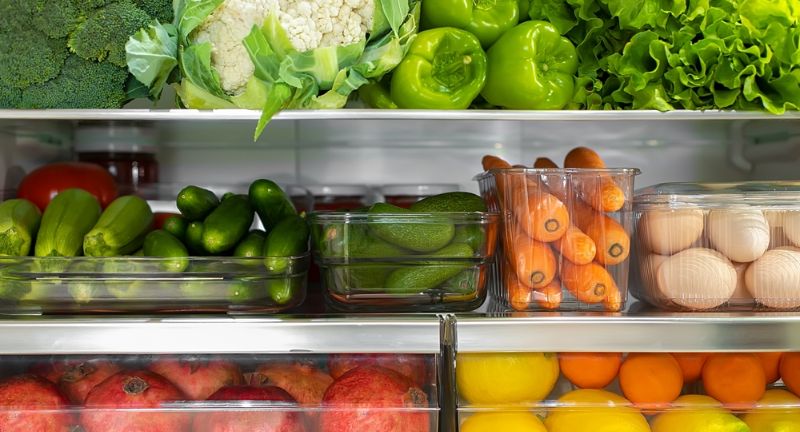
Shutterstock
Refrigerators and freezers play an essential role in food preservation, operating continuously and thus contributing to ongoing energy consumption. Older models, in particular, tend to be less energy efficient, leading to higher electricity bills. When choosing these appliances, it’s important to consider their energy ratings and perform regular maintenance to ensure they function efficiently. Some strategies to reduce energy consumption include avoiding overstocking the appliance, keeping the door seals clean and secure, and placing the unit away from heat sources.
Reducing Household Energy Consumption with Computers and Laptops

Shutterstock
Computers and laptops can significantly increase household electricity consumption, especially when used for extended periods or demanding applications. To help reduce energy usage during inactivity, utilizing energy-saving settings like sleep mode is beneficial. Additionally, developing the habit of shutting down these devices when not in use can lead to lower electricity costs. Choosing energy-efficient models during upgrades can also make a notable impact on reducing overall energy consumption in the long run.
Space Heaters
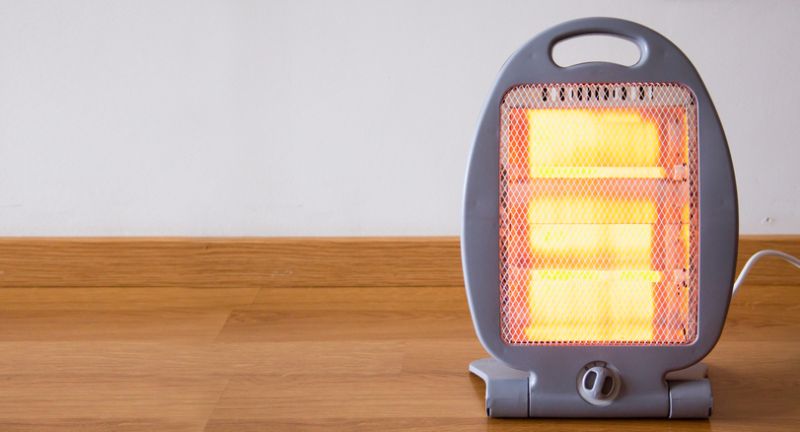
Shutterstock
Space heaters, often used to warm particular areas within a home, can be highly inefficient and contribute to rising electricity bills. They require a significant amount of power for the amount of space heated, making them an expensive choice for extended periods. To lessen dependence on space heaters, it’s advisable to enhance home insulation or explore more energy-efficient heating options. If space heaters are necessary, choosing models equipped with thermostats and features designed to conserve energy can help manage and reduce electricity consumption.
Home Entertainment Systems
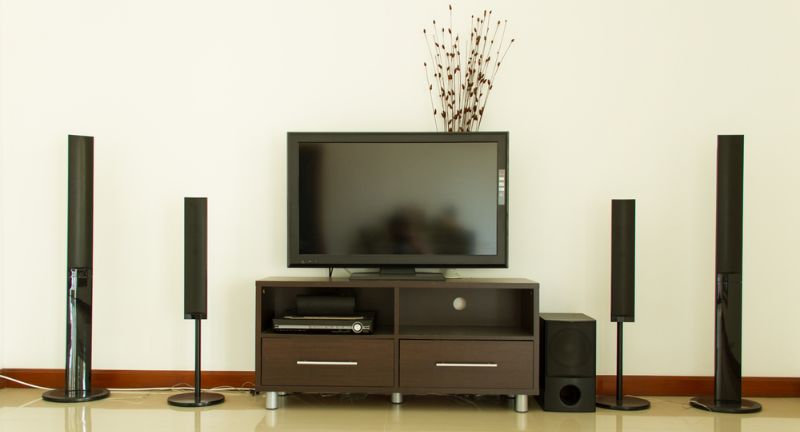
Shutterstock
Home entertainment setups, encompassing televisions, gaming consoles, and audio systems, often account for a substantial portion of energy consumption, especially in households where they are heavily used or left in standby mode. The electricity used by these devices can make a noticeable difference in your energy bills. To mitigate their energy footprint, it’s beneficial to enable energy-saving modes and ensure devices are fully turned off when not in use. Opting for energy-efficient models and employing smart power strips that can cut power when devices are not actively being used are additional strategies to control and minimize electricity consumption.
Electric Kettles
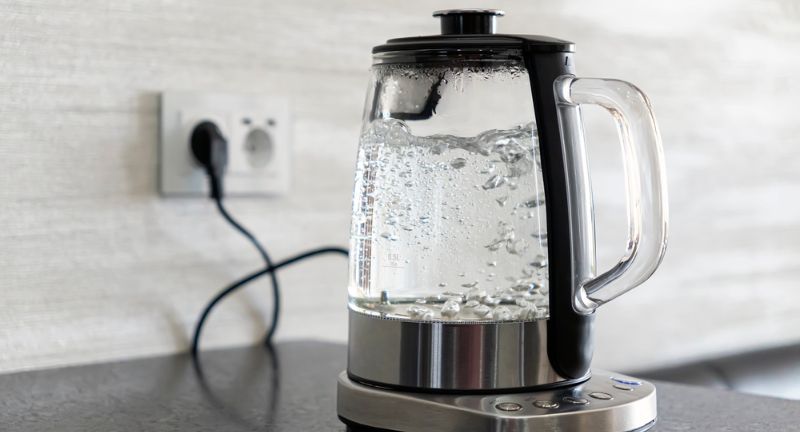
Shutterstock
Electric kettles are renowned for their speedy and efficient water heating abilities. However, when used multiple times daily, they can become substantial electricity consumers. Despite their convenience, frequent use can significantly elevate your electricity bill. To save energy, it’s recommended to heat only the amount of water you need, as heating excess water leads to energy waste. Additionally, opting for an energy-efficient kettle can further reduce electricity usage, making it an excellent choice for individuals aiming to cut down on their energy consumption.
Efficient Heating Solutions for Cold Regions
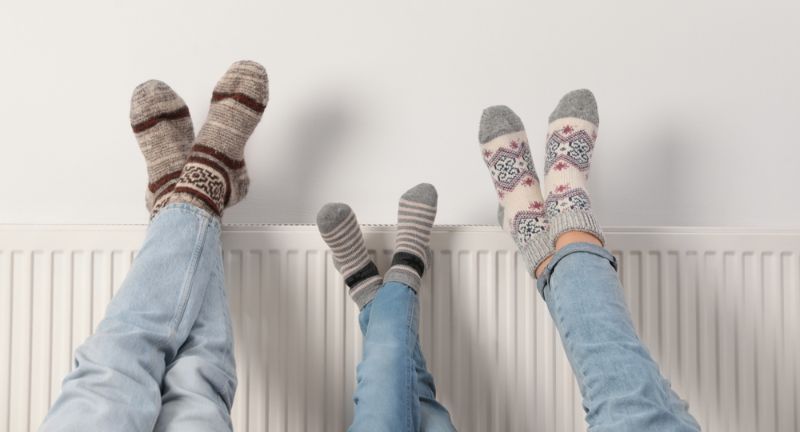
Shutterstock
In colder regions, heating systems such as furnaces, boilers, and heat pumps are significant energy consumers. These systems require substantial electricity to generate warmth, which results in higher energy bills during the winter months. To reduce energy consumption, it is advisable to invest in energy-efficient models and maintain regular upkeep. Additionally, homeowners can achieve further savings by properly insulating their homes and using programmable thermostats to optimize heating schedules efficiently.
Energy Consumption of Clothes Dryers
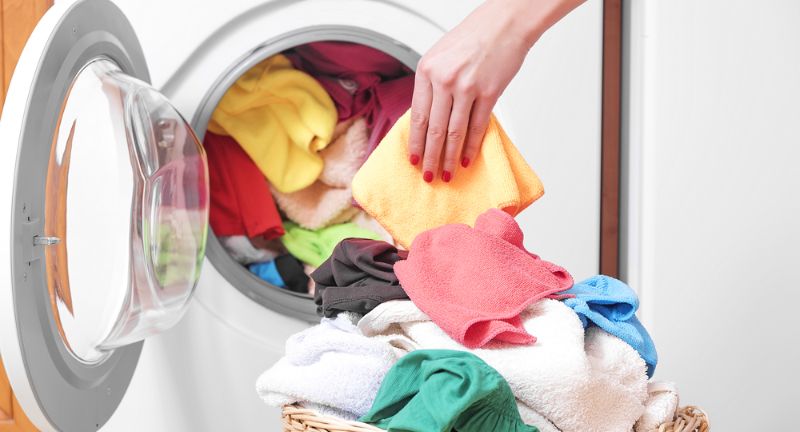
Shutterstock
Clothes dryers are notable for their considerable energy usage in many households, especially older models that lack energy-efficient technologies. These machines require substantial electricity to generate the hot air necessary for drying clothes, which can result in higher energy bills. To reduce energy consumption, it is recommended that homeowners air dry their clothes when possible or purchase energy-efficient dryer models. Furthermore, routine maintenance, such as cleaning the lint filter after each cycle, can improve the dryer’s performance and decrease its energy usage.
Conclusion
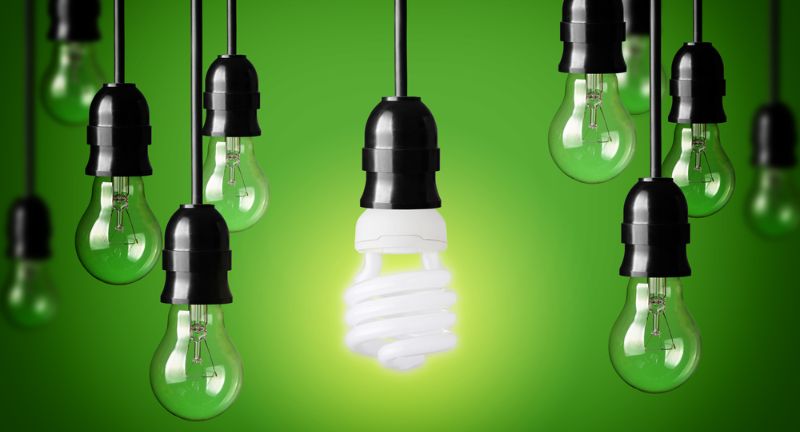
Shutterstock
Managing the energy consumption of household appliances is essential for reducing electricity bills and lessening environmental effects. Focusing on energy-efficient practices, such as purchasing efficient appliances, using them efficiently, and maintaining them properly, can result in substantial savings for homeowners. Minor changes in the operation of household devices can lead to significant energy savings over time. Embracing these energy-conscious habits not only helps lower costs but also contributes to a more sustainable future for everyone.
ADVERTISEMENT - CONTINUE BELOW
About Money+Investing
Money + Investing provides our community with the latest personal and business finance news from around the world. We publish money saving and earning tips to help you make smartier investing decisions. We're inspired by exploring and providing new ways for our audience to achieve financial freedom. We can't wait to share all of our exciting deals, guides and reviews to help you live your financial life to the fullest.
More Money + Investing
-


Want the Job? Avoid Asking These 22 Interview Questions
-


20 Red Flags You’re Stuck in a Toxic Friendship
-


Coach AK: Empathy is a ‘Must-Have’ For Building Successful Business…
-


Biden Aims for Historic High with 44.6% Capital Gains Tax…
-


16 Ultra-Luxurious Vacations Worth Every Penny
-


15 Spending Habits That Shout ‘I’m Flat Broke!’
-


20 Sports That Are Losing Popularity At a Fast Pace
-


20 Surprising Effects Being “Woke” Has On Your Mental Health
-


20 Motivations Behind Baby Boomers’ Shift to Minimalism
-


24 Items That Are Too Pricey for Shoppers Now
-
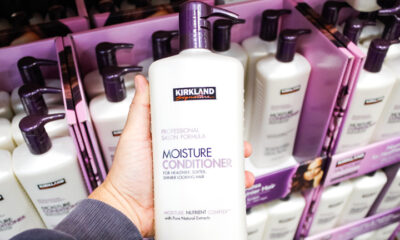

Unmasking Kirkland: The Big Brands Behind Costco’s Best Buys
-


19 Valid Baby Boomer Gripes That Make Total Sense
